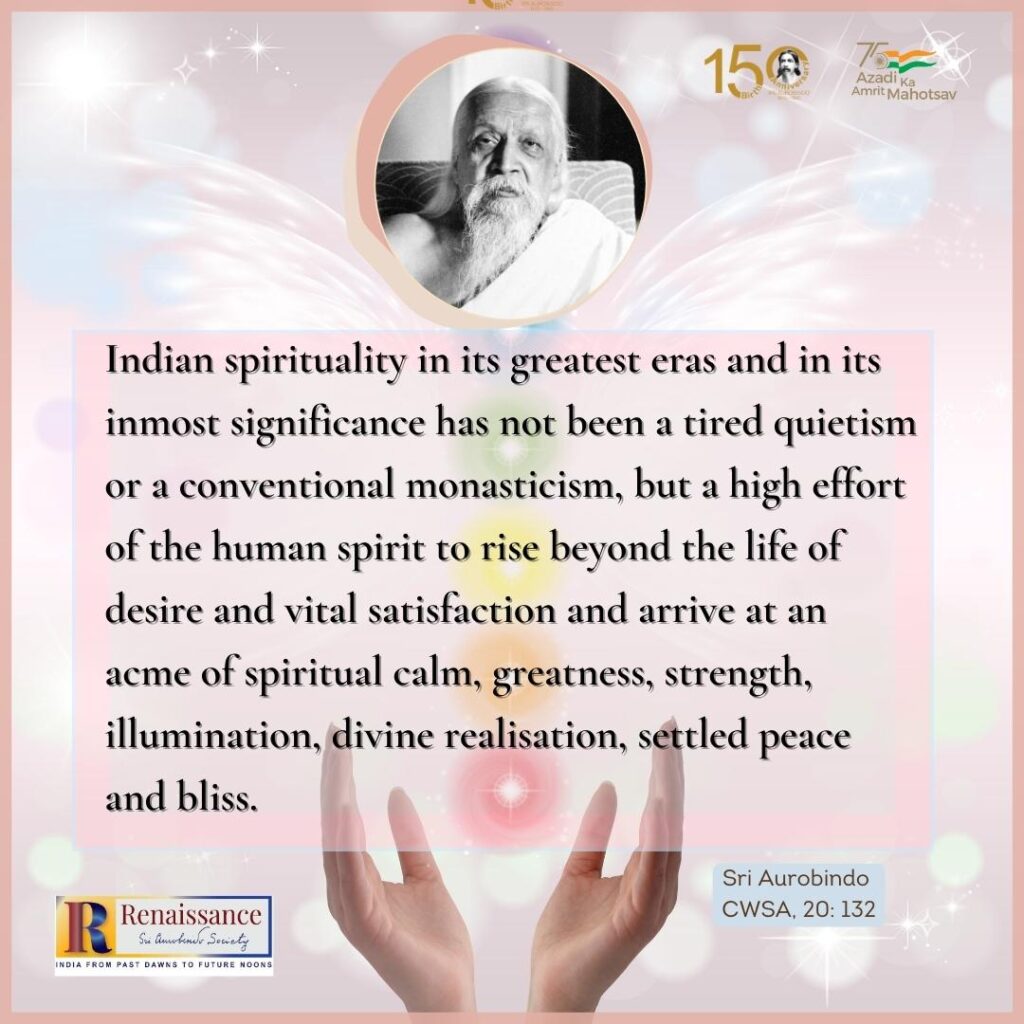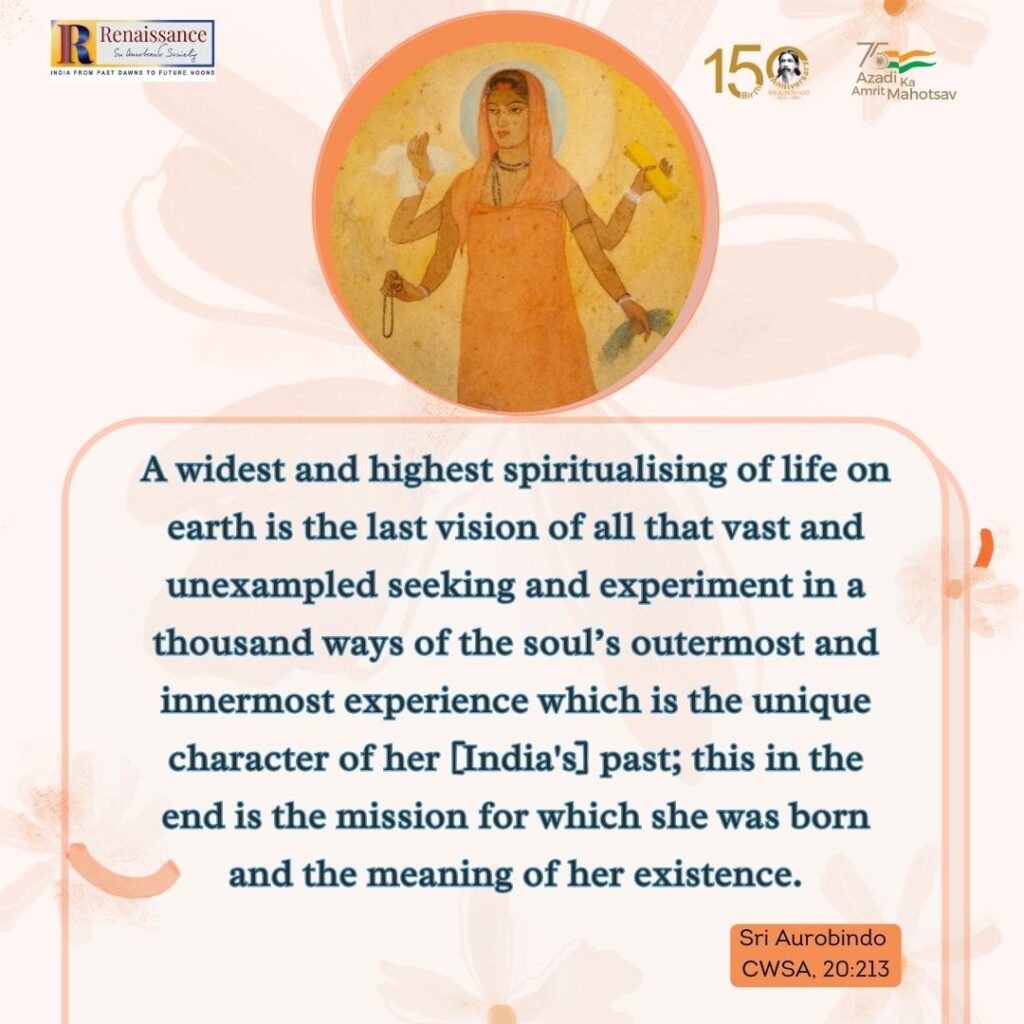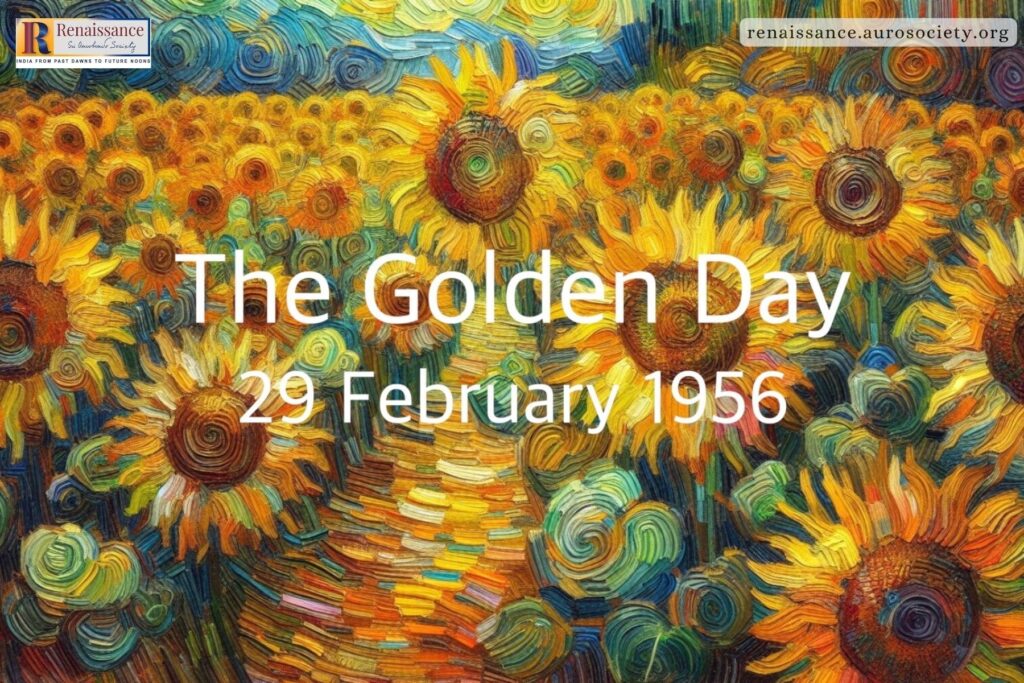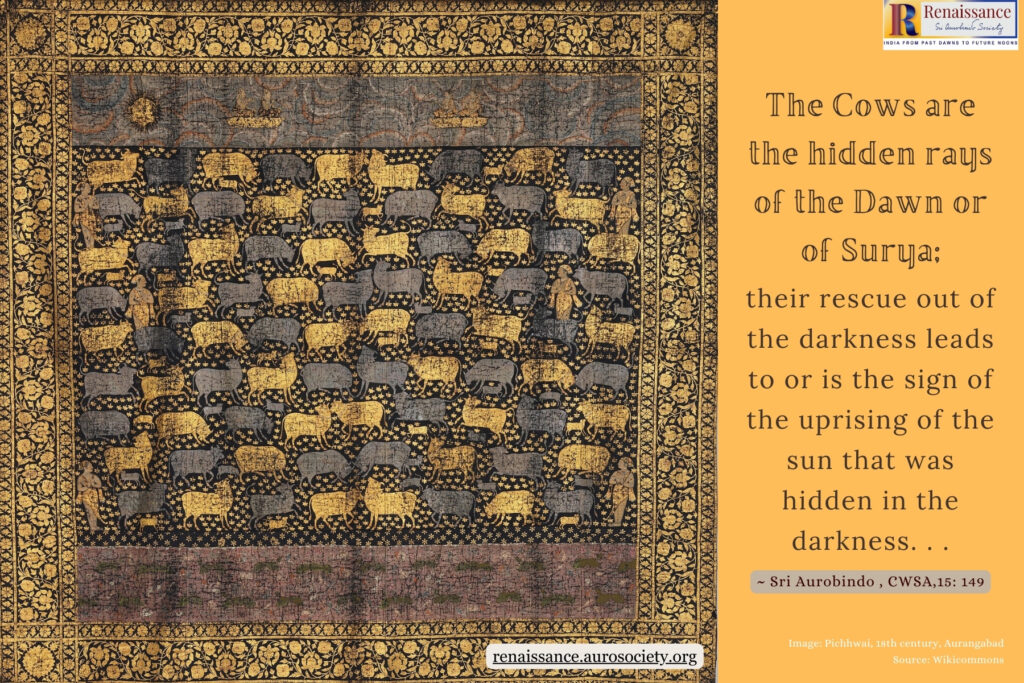Editor’s note: Some rephrasing of the text along with some formatting revisions are done in this part of the essay for a smoother reading flow in digital version.
CONTINUED FROM PART 3

Nowadays the word ‘spirituality’ is being used in a vague sense and it is interpreted variously including at times, intellectual idealism, ethical effort, even social service. It is true that all elevating activities of man do contain some element of spirituality. But with regard to Indian culture it carries a definite sense.
“Spirituality has meant hitherto a recognition of something greater than mind and life, the aspiration to a consciousness pure, great, divine beyond our normal mental and vital nature, a surge and rising of the soul in man out of the littleness and bondage of our lower parts towards a greater thing secret within him.”
~ Sri Aurobindo, CWSA, Vol. 20, p. 121
Sri Aurobindo emphasises that the Indian idea of the world, of Nature and of existence is not physical, but psychological and spiritual. He further explains this conception of existence in the these words:
Spirit, soul, consciousness are not only greater than inert matter and inconscient force, but they precede and originate these lesser things.
All force is power or means of a secret spirit; the Force that sustains the world is a conscious Will and Nature is its machinery of executive power. Matter is the body or field of a consciousness hidden within it, the material universe a form and movement of the Spirit. Man himself is not a life and mind born of Matter and eternally subject to physical Nature, but a spirit that uses life and body.
~ CWSA, Vol. 20, p. 151
Sri Aurobindo tells us that an understanding faith in this conception of existence, an attempt to live it out, the science and practice of this high endeavour, and an “aspiration to break out in the end from this mind bound to life and matter into a greater spiritual consciousness . . . is the innermost sense of Indian culture.” (CWSA, Vol. 20, p. 151)

He further writes that for an Indian the ultimate truths are truths of the spirit.
And also that the “truths of the spirit are the most fundamental and most effective truths of our existence, powerfully creative of the inner, salutarily reformative of the outer life.” (CWSA, Vol. 20, p. 113). Indian culture has held up the goal of a supreme and arduous self-exceeding as the summit of human endeavour.
Indian spirituality in its greatest eras and in its inmost significance has not been a tired quietism or a conventional monasticism, but a high effort of the human spirit to rise beyond the life of desire and vital satisfaction and arrive at an acme of spiritual calm, greatness, strength, illumination, divine realisation, settled peace and bliss.
~ Sri Aurobindo, CWSA, Vol. 20, p. 132
[. . .]
Sri Aurobindo poses an important question whether the vehement secular activism of the modern mind will accept that such an endeavour is essential to man’s highest perfection.
And he cautions that there is a danger that India too may become a “brown ape of Europe” under the strain of dominant European ideas.
The danger is that the pressure of dominant European ideas and motives, the temptations of the political needs of the hour, the velocity of rapid inevitable change will leave no time for the growth of sound thought and spiritual reflection and may strain to bursting-point the old Indian cultural and social system, and shatter this ancient civilisation before India has had time to readjust her mental stand and outlook or to reject, remould or replace the forms that can no longer meet her environmental national necessities, create new characteristic powers and figures and find a firm basis for a swift evolution in the sense of her own spirit and ideals.
~ CWSA, Vol. 20, pp. 172-173
There is a strong need to emphasise the spiritual aspect of our culture because even though India is politically free, the danger to her culture is, perhaps, greater than ever before. [. . .]
Man, today, is trying to overcome the limits of outer space without overcoming the limitations of his consciousness. He seems to be on the point of being overcome by his own achievements unless he changes himself. . . Sri Aurobindo saw that mere political, economic, social or any other external changes would not solve the problems of life though all may be attempted by man in his present state.
The change required is psychological—an inner change. But this inner change needed is far more radical than merely embodying ethical values, Sri Aurobindo points out. Living up to ethical values and ideals can be a stage, an important step, in the direction of the required change which is radical. A radical transformation of man’s nature is needed. Such a radical change can come by putting spirituality in the centre of all human activities.
Sri Aurobindo sees the course of Indian history as a gradual and chequered growth towards a complete spiritual living.
It is her founding of life upon this exalted conception and her urge towards the spiritual and the eternal that constitute the distinct value of her civilisation. And it is her fidelity, with whatever human shortcomings, to this highest ideal that has made her people a nation apart in the human world.
~ CWSA, Vol. 20, p. 57
He therefore wants free India to accept boldly the challenge of the age and give the world a lead in solving problems of collective life by applying her spiritual ideals. He states:
A widest and highest spiritualising of life on earth is the last vision of all that vast and unexampled seeking and experiment in a thousand ways of the soul’s outermost and innermost experience which is the unique character of her past; this in the end is the mission for which she was born and the meaning of her existence.
~ CWSA, Vol. 20, p. 213

Sri Aurobindo cautions that India may be tempted to follow certain directions which may lead her to become a “nation like many others evolving an opulent industry and commerce, a powerful organisation of social and political life, an immense military strength, practising power-politics with a high degree of success, guarding and extending zealously her gains and her interests, dominating even a large part of the world.” But in doing so, and “in this apparently magnificent progression” India will forfeit its Swadharma, lose its soul. (CWSA, Vol. 36, p. 504)
Ancient India and her Spirit might disappear altogether and India would have become one more nation like the others. This, Sri Aurobindo emphasises would be “real gain neither to the world nor to us.”
It would be a tragic irony of fate if India were to throw away her spiritual heritage at the very moment when in the rest of the world there is more and more a turning towards her for spiritual help and a saving Light.
~ CWSA, Vol. 36, p. 504
India would best serve and increase the sum of human progress by “a new creation of the old Indian Swadharma, not a transmutation to some law of the Western nature.” Creative assimilation of the new thought and ideas is needed. And as Sri Aurobindo reminds us:
A mastering and helpful assimilation of new stuff into an eternal body has always been in the past a peculiar power of the genius of India.
~ CWSA, Vol. 20, p. 78
The seer Sri Aurobindo says that the renaissance of India is “inevitable as the rising of tomorrow’s sun” and it will be “one of the most formidable phenomena of the modern world.” (CWSA, Vol. 25, p. 333). It is important to emphasise that Sri Aurobindo has lived the great spiritual Truth about which he has written. He is the embodiment of the Spiritual Reality which he affirms in his great works. He has contributed a body of vast literature embodying his vision of the Reality and man’s destiny on earth.

CONCLUDED

Read Part 1, Part 2, Part 3
~ Design: Beloo Mehra



